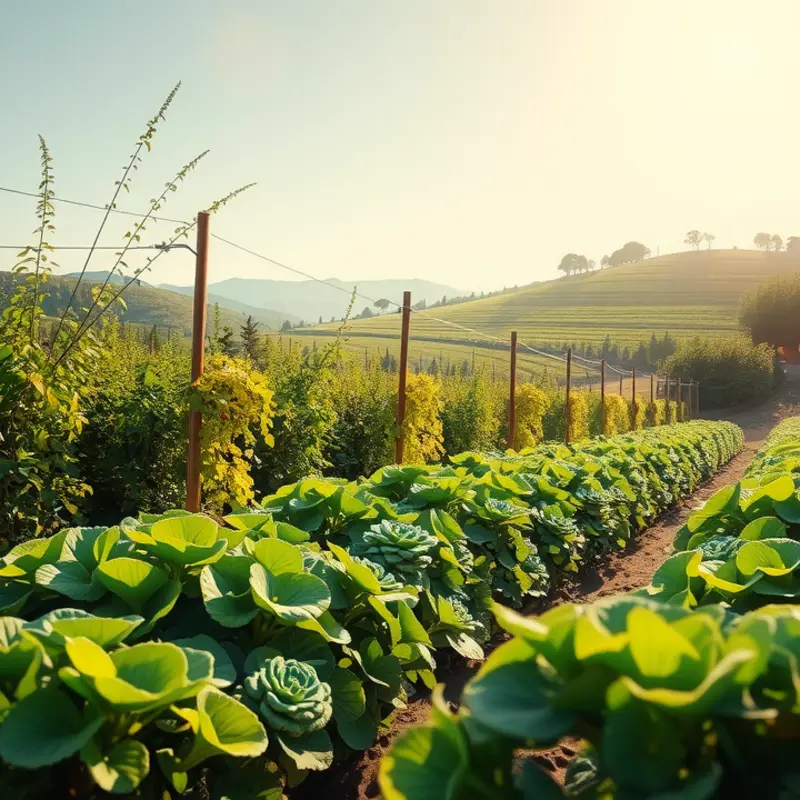Food waste is a pervasive issue that not only affects our wallets but also contributes significantly to environmental degradation. With over a third of all food produced globally wasted, the impact on our planet is staggering. For environmentally-conscious individuals, understanding these statistics can lead to actionable steps that promote sustainable living and help minimize waste. By making mindful food choices and implementing simple changes in daily habits, we can collectively reduce our carbon footprints while fostering a culture of sustainability.
Mind-Boggling Food Waste Statistics

Food waste is an issue of epic proportions, and the statistics are nothing short of alarming. Each year, approximately 1.3 billion tons of edible food is wasted globally. That equates to one-third of all food produced being lost before it reaches our plates. The implications of this are vast, particularly when one considers the resources expended in the production process.
Water, a vital resource, is heavily consumed in agriculture, with about 70% of global freshwater withdrawals being dedicated to food production. When food is wasted, the water used to grow that food goes to waste as well. Studies suggest that around 170 trillion liters of water are lost annually due to food waste. Such wastage is akin to losing the water needed for millions of people each year.
Another critical resource affected by food waste is land. A staggering 28% of the world’s agricultural land is used to produce food that eventually gets wasted. This unnecessary usage of land contributes to deforestation and habitat loss as more land is cleared to meet the demands of food production. Moreover, when food waste decomposes in landfills, it releases methane, a potent greenhouse gas that is 25 times more effective than carbon dioxide at trapping heat in the atmosphere.
The carbon footprint of food wastage is equally troubling, contributing to 8-10% of global greenhouse gas emissions. This places food waste among the top contributors to climate change, surpassing the emissions of major countries. If food wastage were a country, it would be the third-largest emitter of carbon dioxide after China and the United States.
Aside from environmental impacts, food wastage also incurs significant economic costs, estimated at approximately $1 trillion annually. These losses affect all stages of the supply chain, from farmers to consumers. Despite these staggering figures, reducing food waste presents a viable solution to mitigate environmental damage. Initiatives can begin at home by adopting smarter food storage and cooking practices, thereby minimizing waste and reducing one’s carbon footprint.
To explore ways to enhance storage and reduce waste in the kitchen, consider visiting this guide on safer storage of sauces, which offers practical tips for extending food longevity.
Understanding the scale of food waste is essential in driving individual and collective actions. The statistics underscore the need for sustainable practices to preserve precious resources and protect the environment. By making conscious choices, each of us can contribute to a more sustainable future.
Practical Solutions to Reduce Food Waste

Armed with knowledge about food waste, the next step is identifying practical strategies to minimize it. Start by planning meals: outline dishes for the week to avoid purchasing unnecessary items. This approach not only reduces waste but also adds efficiency to your shopping routine. Creating a simple meal plan helps identify what ingredients you already have, reducing duplicate purchases.
Once your meals are planned, track your eating habits and adjust buying accordingly. Utilize digital apps or a traditional grocery list to stay organized. You may even discover opportunities to batch cook, which not only saves time but also helps achieve portion control.
Composting is a powerful way to repurpose kitchen scraps instead of sending them to the trash. This organic process transforms food waste into valuable nutrients, enriching soil naturally. Start composting by designating a bin for scraps like fruit peels, coffee grounds, and eggshells. These can decompose at home or be delivered to community composting programs.
When it comes to meal leftovers, creativity is key. Instead of viewing leftovers as old meals, transform them into something new. For instance, leftover rice can become a stir-fried dish. Freeze leftovers that you won’t consume immediately to avoid spoilage. Label containers with dates to track freshness.
Educate yourself on food labels, as misconceptions often lead to unnecessary disposal. The difference between ‘sell by’ and ‘use by’ dates can be confusing but is critical. ‘Sell by’ generally indicates a date for retailers’ use, while ‘use by’ suggests when a product will be at its peak quality. Consuming foods past these dates doesn’t always mean they’re unsafe, so relying on sensory checks can avoid unnecessary waste.
Implement small kitchen practices that have large impacts. Use airtight containers for storage to extend the shelf life of foods. Watch out for proper storage tips to minimize spoilage and maintain food quality. For more tips, see safer storage of sauces.
Connecting with community efforts amplifies the impact of your actions. Join programs focused on food rescue or donate excess food to local food banks. Participating in urban gardening initiatives not only helps distribute surplus produce but also educates about sustainability. Additionally, advocating for developments in local food systems can lead to broader, community-wide changes.
Engaging in conversations about sustainable food management practices can inspire others to change their habits too. Hosting educational events or group discussions around food waste encourages collective action. Responsibility starts with small steps, but by sharing insights and solutions, together we can reduce food waste substantially.
Final words
Reducing food waste is crucial for preserving our planet’s resources and minimizing environmental harm. Each statistic highlights the gravity of food waste as an environmental issue, but they also serve as a call to action. By implementing practical solutions, like meal planning and composting, eco-conscious individuals can make meaningful contributions to solving this global challenge. It’s not just about cutting waste; it’s about nurturing our planet for future generations. Begin today, make small changes, and be a part of the movement towards sustainable living. Together, we can make a difference!








